Overview
Diabetes jobs encompass a range of roles dedicated to supporting individuals in managing their condition. These include Certified Diabetes Educators (CDEs), registered dietitians, and healthcare providers, all of whom play essential parts in patient education and care. It’s heartening to see the collaborative efforts of these professionals, as they emphasize the importance of tailored education, community support, and continuous learning. Together, they strive to improve health outcomes for those living with diabetes.\n\nYou're not alone in this journey. The dedication of these professionals ensures that you receive the compassionate care and support you need. Their work highlights how personalized education can make a significant difference in managing diabetes effectively. By fostering a supportive community, they create an environment where continuous learning is encouraged, empowering you to take charge of your health.\n\nAs you navigate through your experience with diabetes, remember that there are resources available to help you. Seeking support from these professionals can provide you with the knowledge and tools necessary to manage your condition confidently. It's understandable to feel overwhelmed, but connecting with others who share similar experiences can be incredibly reassuring. We are here to support you every step of the way.
Introduction
In the intricate world of diabetes management, a mosaic of roles and responsibilities is essential for empowering individuals to navigate their health journeys effectively. It's understandable to feel overwhelmed, but know that you are not alone in this journey. From Certified Diabetes Educators (CDEs) who provide personalized education and support to registered dietitians crafting tailored meal plans, the collaborative efforts of healthcare professionals are pivotal in achieving optimal outcomes for patients.
As T2DSolutions prepares to launch as a comprehensive resource hub for Type 2 and Type 3 diabetes education, it promises to enhance the capabilities of these professionals while addressing the growing prevalence of diabetes in various occupational groups. With an increasing focus on community support and innovative care models, the landscape of diabetes care is evolving. This evolution highlights the necessity for early detection, preventive measures, and a robust support system to foster resilience among those affected. Together, we can navigate these challenges, and we are here to support you every step of the way.
Overview of Diabetes Care Roles and Responsibilities
A diabetes job encompasses a diverse array of roles crucial for supporting individuals in effectively managing their condition. Among these, Certified Diabetes Educators (CDEs) play a pivotal role in providing education and support, imparting essential self-management strategies that empower individuals. Registered dietitians focus on nutritional guidance, creating personalized meal plans that align with individuals' health objectives.
It's important to recognize that healthcare providers such as endocrinologists and primary care physicians contribute their expertise to ensure a comprehensive approach to managing blood sugar conditions. The joint efforts of these experts are essential in attaining optimal health results for individuals managing their condition. As T2DSolutions launches as a new resource center devoted to education and community assistance for Type 2 and Type 3 diabetes job conditions, it becomes an invaluable ally for recently diagnosed individuals.
This platform will provide essential resources, information, and support to enhance the diabetes job roles of CDEs and other care professionals, ensuring that patients receive the comprehensive care they need. Research indicates that specific occupations have a higher prevalence of this condition, with protective services at 8.9%, farming, fishing, and forestry at 8.8%, and community and social services at 8.4%. According to Taylor M Shockey, PhD, from the National Institute for Occupational Safety and Health, 'the three broad occupation groups with the highest adjusted prevalence of this condition' highlight the need for targeted interventions in these fields.
Furthermore, the increasing incidence of type 1 conditions among youth, particularly in diverse ethnic groups, emphasizes the importance of early detection and preventive measures. The case study titled 'Trends in Type 1 and Type 2 Conditions in Youth (2002-2018)' reveals that from 2002 to 2018, the incidence of type 1 conditions significantly increased among children and adolescents, underscoring the critical need for early detection strategies. As care for glucose regulation continues to evolve, the impact of CDEs and other key roles within management becomes increasingly significant, reinforced by the educational interventions and resources provided by T2 Solutions to enhance patient outcomes.
T2 Solutions is presently in the process of launching, and we invite you to subscribe for updates to remain informed about the resources that will soon be accessible to assist your health management journey. You're not alone in this journey, and we are here to support you every step of the way.
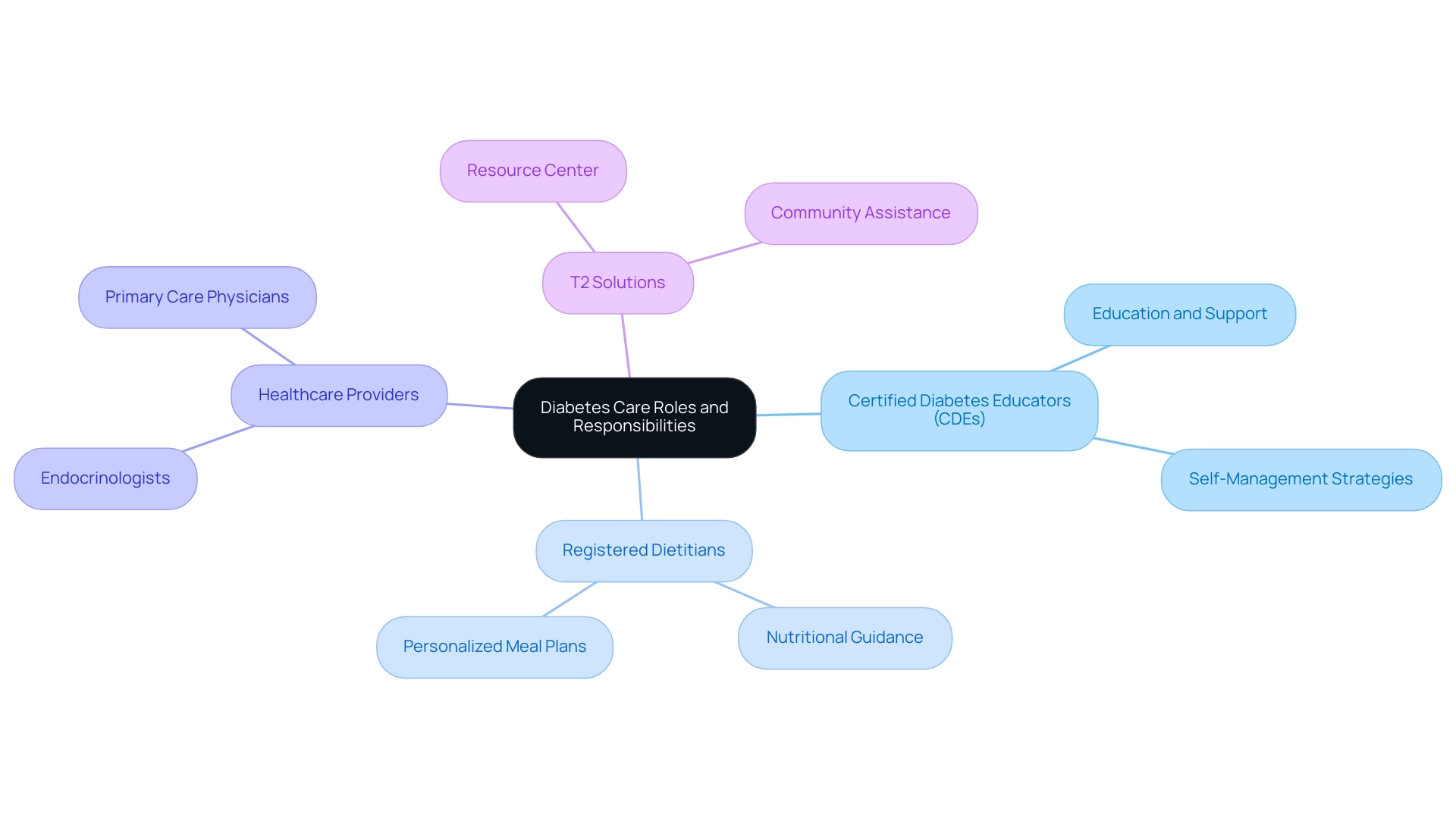
Daily Responsibilities of Certified Diabetes Educators
T2DSolutions is excited to introduce a new resource center designed to empower individuals living with Type 2 and Type 3 conditions. Our goal is to provide extensive education and community assistance, helping you navigate this journey with confidence. Certified Diabetes Educators (CDEs) are here for you, playing a vital role in this mission by offering tailored education and support that enhances your ability to manage your condition. Each day, they conduct individualized consultations to understand your unique needs, allowing them to create personalized education plans that focus on important areas like blood glucose monitoring, medication management, and necessary lifestyle changes.
In addition to one-on-one sessions, CDEs also facilitate group classes that foster a sense of community. These gatherings provide a safe space for individuals to share their experiences and best practices, creating a supportive network. With a commitment to staying updated on the latest research in blood sugar management, CDEs offer evidence-based suggestions that not only enhance your understanding but also build your confidence in self-management. Research shows that CDEs can lead to better clinical outcomes, including a reduction in emergency and inpatient services, highlighting their essential role in empowering you to take charge of your health.
As Jay H. Shubrook emphasizes, improving each individual’s efficiency through education can significantly reduce the burden of self-care. This, in turn, helps those with the condition enhance their glucose management and overall quality of life. It underscores the transformative power of health education strategies, which are crucial for addressing therapeutic inertia and encouraging active participation in self-management. T2DSolutions is committed to providing essential resources and assistance, including information on career opportunities, such as diabetes jobs, within the care ecosystem. Roles like community health workers, dietitians, and social workers are also vital, further highlighting the significant contributions of CDEs.
We invite you to subscribe and stay updated on new content and resources as they become available. This way, you will be informed about both health management and career opportunities in this important field. Remember, you’re not alone in this journey—we are here to support you every step of the way.
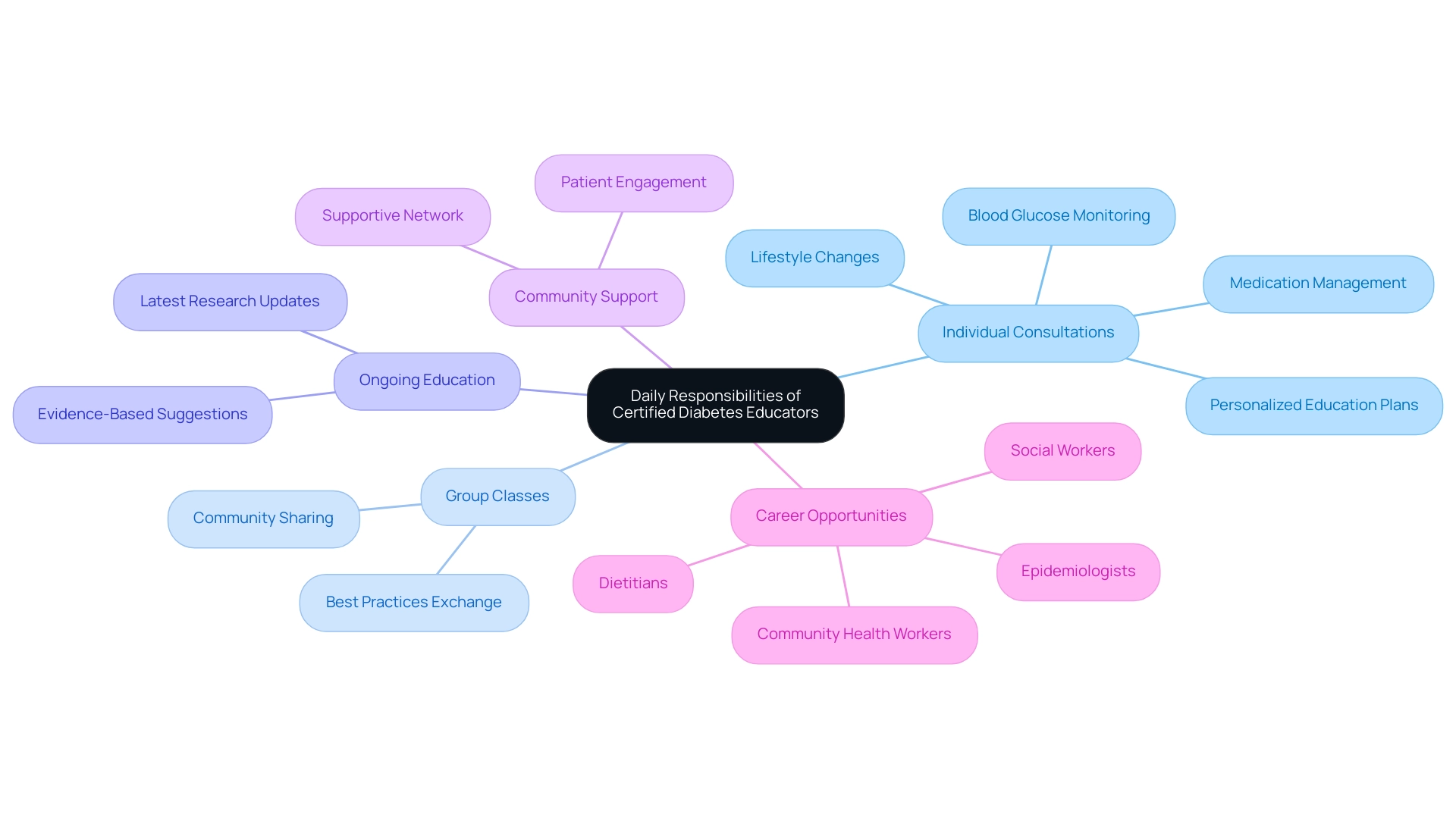
Essential Qualifications and Skills for Diabetes Care Professionals
As T2DSolutions launches as a new resource hub for education and support regarding diabetes, it's essential to understand the qualifications and skills needed for professionals in this field. Experts aiming to excel in managing diabetes-related conditions often come from diverse healthcare backgrounds, such as nursing, dietetics, or pharmacy. To become a Certified Diabetes Educator (CDCES), candidates must complete at least 1,000 hours dedicated to self-management education and successfully pass a certification exam.
This credentialing process is crucial, especially as statistics show an increasing number of healthcare providers pursuing the CDCES designation. This reflects a growing recognition of the importance of specialized care for individuals facing blood sugar challenges. Key skills for success in this role include effective communication, empathy, and the ability to motivate individuals toward achieving their health goals. Additionally, a deep understanding of the condition's pathophysiology, healthy coping strategies, medication management, and self-management techniques is vital.
Wendy Lopez, MS, RD, CDCES, shares, 'One key insight about being a CDCES is the importance of continuous learning and staying updated with the latest research and guidelines.' Continuous professional growth through workshops and courses is strongly encouraged to help educators stay aligned with the evolving nature of health management practices. This ensures they are well-prepared to meet the diverse needs of those they serve. T2DSolutions is here to support these professionals by providing access to the latest resources, research, and community support.
Maintaining credentials does come with costs. For example, the renewal for subsequent five-year periods of BC-ADM certification costs $500 for ADCES members and $800 for non-members. The role of Diabetes Management and Education Specialists (DCESs) is also crucial in improving the quality of blood sugar management. Case studies have shown that quality enhancement initiatives led by DCESs can lead to better health outcomes and increased client satisfaction. T2DSolutions will serve as a platform for sharing best practices and resources, empowering access and enhancing patient support. You're not alone in this journey; we are here to support you every step of the way.
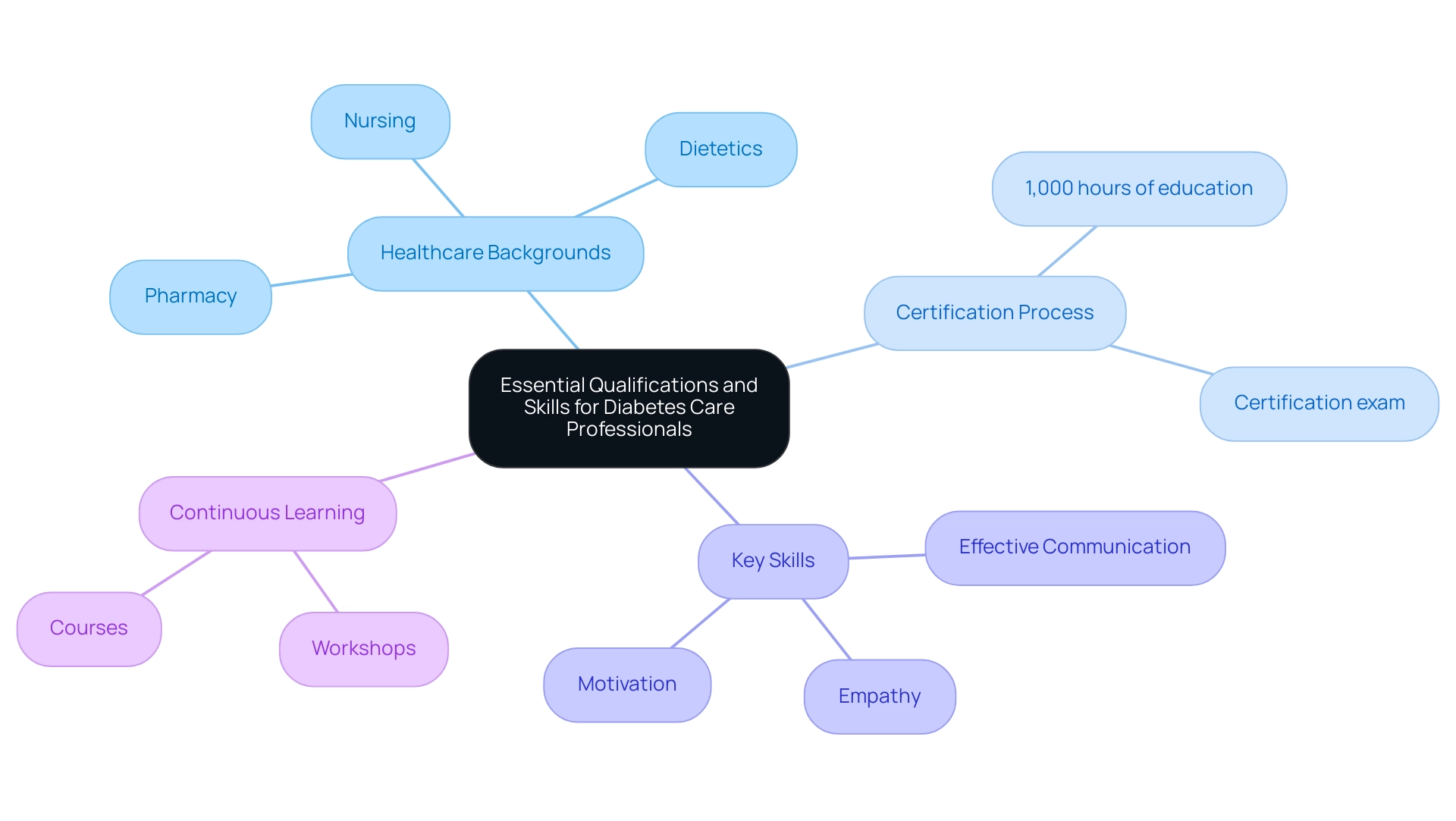
Exploring Job Opportunities in Diabetes Care
Managing health conditions related to diabetes opens up a wealth of job opportunities in various healthcare settings, and it's important to know that you are not alone in this journey. Positions such as Certified Diabetes Educators and specialists play a vital role, with numerous roles available in research, policy formulation, and community outreach. Professionals can explore employment in a range of environments, including hospitals, outpatient clinics, community health organizations, and educational institutions, all dedicated to supporting those with diabetes.
The rise of telehealth and digital health platforms has led to new roles that meet the increasing demand for remote management solutions for blood sugar conditions. It's understandable to feel overwhelmed, especially when studies reveal that about 80.6% of U.S. adults with diagnosed conditions face additional health challenges, like high blood pressure. This underscores the urgent need for effective treatment and management strategies. Moreover, the indirect costs stemming from lost productivity due to 277,000 premature deaths linked to diabetes reach a staggering $19.9 billion, illustrating the broader impact of this illness on workforce participation.
For those passionate about advocacy and policy, numerous opportunities exist within nonprofit organizations and governmental agencies focused on improving care and education related to diabetes. T2DSolutions is here to support newly diagnosed patients by providing resources and connections to diabetes job opportunities in the health sector. Networking through professional associations, such as the American Diabetes Association, can also offer invaluable resources and connections for those seeking a diabetes job in this field.
As highlighted by Taylor M Shockey, PhD, at the National Institute for Occupational Safety and Health, the three occupational groups with the highest prevalence of diabetes—protective services (8.9%), farming, fishing, and forestry (8.8%), and community and social services (8.4%)—demonstrate a significant intersection between health and workforce participation. Addressing these health-related employment concerns is crucial, as research indicates that individuals with diabetes are significantly more likely to leave their jobs due to health issues, which can further affect the workforce landscape. Remember, we are here to support you every step of the way.
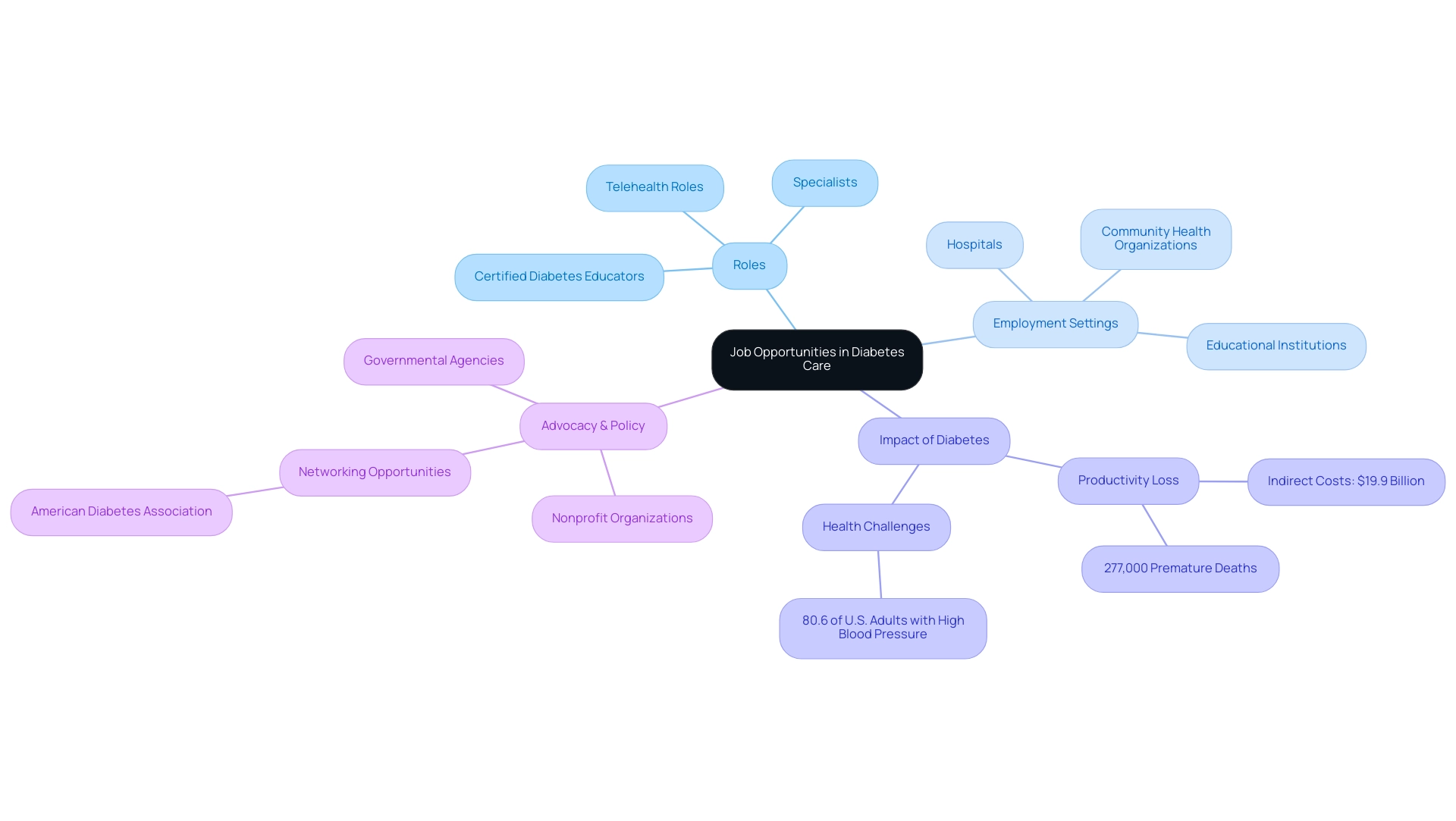
The Role of Community and Support in Diabetes Management
Community assistance plays a vital role in managing diabetes, offering individuals a strong network of resources and encouragement. At T2DSolutions, we are dedicated to empowering those who have recently received a diagnosis through a variety of upcoming events designed to provide valuable insights and support. Research shows that over 85% of parents express satisfaction with treatment, highlighting the effectiveness of collaborative assistance systems.
Support groups and community health initiatives empower patients to share their experiences and learn from one another. This creates a foundation of emotional support that is crucial for successful management. Programs that actively involve family members and friends in blood sugar education promote a collaborative self-management approach, significantly enhancing adherence to treatment plans. Additionally, local organizations often provide invaluable resources such as workshops, fitness classes, and nutrition counseling, all of which can lead to improved health outcomes.
The case study titled 'Understanding the social factors that contribute to this condition' underscores how physical and social environments influence management, emphasizing the need for innovative care delivery models to address health disparities. Recent studies also reveal a concerning link between food insecurity and negative outcomes related to blood sugar regulation, including poor metabolic control and lower adherence to self-management behaviors. Engaging with community resources allows individuals facing blood sugar issues to cultivate a supportive environment that not only encourages healthier lifestyles but also fosters resilience in managing their condition.
As Zachrieh Alhaj points out, innovative approaches to care delivery are essential in addressing the socially graded aspects of this condition, ensuring fair access to education and support for all patients. Recent initiatives by T2DSolutions, such as enhanced diabetes support groups and community events, exemplify the movement towards effective diabetes job engagement, showcasing the benefits of collective efforts in improving health outcomes. You're not alone in this journey; we are here to support you every step of the way.
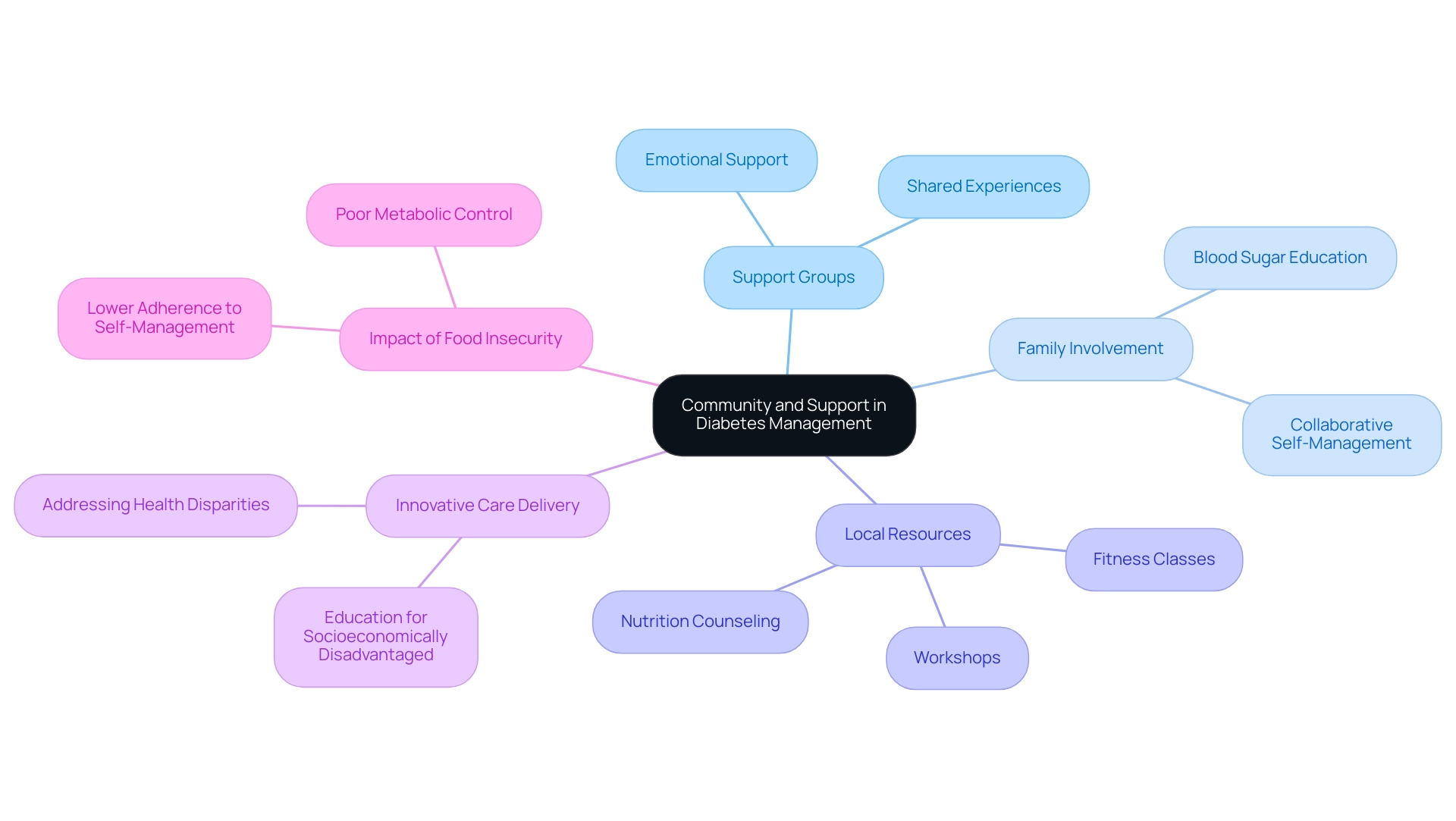
Conclusion
The multifaceted approach to diabetes care highlights the vital importance of collaboration among healthcare professionals, including Certified Diabetes Educators, registered dietitians, and physicians. As T2DSolutions prepares to launch as a pivotal resource hub, it aims to enhance the capabilities of these professionals while addressing the pressing need for effective diabetes management in various occupational groups. The insights shared underscore the significance of personalized education, the necessity for early detection, and the role of community support in fostering resilience among those affected by diabetes.
As the landscape of diabetes care continues to evolve, the emphasis on comprehensive education and support becomes increasingly essential. The commitment of CDEs and other diabetes care professionals to provide tailored strategies for self-management not only improves patient outcomes but also empowers individuals to take charge of their health. Furthermore, the recognition of the growing prevalence of diabetes in specific occupations illustrates the urgent need for targeted interventions that can effectively address these disparities.
In conclusion, the journey towards effective diabetes management is a shared responsibility that thrives on collaboration, education, and community engagement. T2DSolutions stands ready to support individuals navigating this path, ensuring that patients have access to the resources, knowledge, and community connections necessary for successful diabetes management. By fostering a supportive environment, the collective efforts of healthcare professionals and community initiatives will undoubtedly lead to improved health outcomes and a brighter future for those living with diabetes. You're not alone in this journey; we are here to support you every step of the way.
Frequently Asked Questions
What roles are included in diabetes job support?
Diabetes job support includes various roles such as Certified Diabetes Educators (CDEs), registered dietitians, endocrinologists, and primary care physicians, all of whom contribute to managing diabetes effectively.
What is the role of Certified Diabetes Educators (CDEs)?
CDEs provide education and support to individuals with diabetes, offering essential self-management strategies and personalized education plans focusing on areas like blood glucose monitoring and medication management.
How do registered dietitians assist individuals with diabetes?
Registered dietitians focus on nutritional guidance by creating personalized meal plans that align with individuals' health objectives.
What is T2DSolutions and what does it offer?
T2DSolutions is a new resource center aimed at supporting individuals with Type 2 and Type 3 diabetes. It provides education, community assistance, and essential resources to enhance diabetes management.
Why is early detection important for type 1 diabetes conditions?
Early detection is crucial due to the increasing incidence of type 1 diabetes among youth, particularly in diverse ethnic groups. It emphasizes the need for preventive measures and strategies to manage the condition effectively.
What impact do CDEs have on diabetes management?
CDEs significantly improve clinical outcomes, leading to reduced emergency and inpatient services, and empower individuals to take charge of their health through education and support.
How does T2DSolutions plan to support individuals in their health management journey?
T2DSolutions plans to provide resources, information, and updates on career opportunities in diabetes care, ensuring individuals are supported in both health management and professional development.
What evidence supports the effectiveness of CDEs in diabetes care?
Research indicates that CDEs lead to better clinical outcomes and enhanced self-management, which can significantly improve individuals' quality of life and glucose management.
